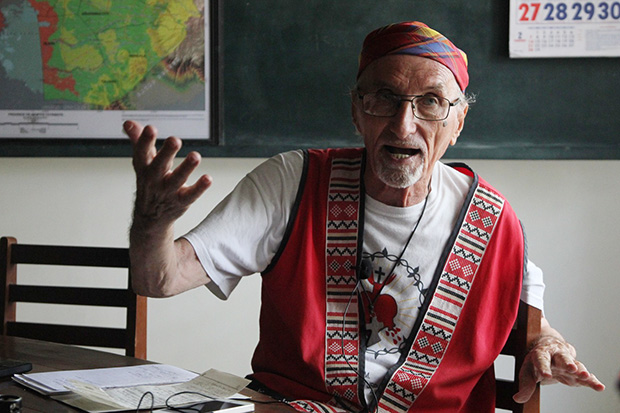KIDAPAWAN CITY (MindaNews/06 April) – An Italian missionary denied rumors he was among those who organized the farmers’ protest in this city last week that ended in a bloody dispersal by police.
 PIME priest Father Peter Geremiah narrates how they stormed the National Food Authority warehouses in Columbio, Sultan Kudarat and in Kidapawan City warehouse back in 1992 and 1998 respectively during an interview in Kidapawan City on April 5, 2016. He makes a comparison between the 1992, 2008 incident and the violent dispersal of farmers last April 1. MindaNews photo by Toto Lozano
PIME priest Father Peter Geremiah narrates how they stormed the National Food Authority warehouses in Columbio, Sultan Kudarat and in Kidapawan City warehouse back in 1992 and 1998 respectively during an interview in Kidapawan City on April 5, 2016. He makes a comparison between the 1992, 2008 incident and the violent dispersal of farmers last April 1. MindaNews photo by Toto Lozano
Fr. Peter Geremia, of the Pontifical Institute for Foreign Missions said on Tuesday it was the Kilusang Magbubukid ng Pilipinas and the Apo Sandawa Lumadnong Panaghiusa sa Cotabato that funded the food and transportation of the protesters coming from remote town of Arakan in North Cotabato.
“I made it clear during the dialogue with the representative of the governor that I wasn’t behind the protests and I wasn’t even aware of the purpose of the rally when some 2,000 people arrived at the gymnasium near the parish in Arakan,” he said in an interview to refute text messages tagging him as the protest organizer.
Geremia was jailed in 1992 after he was accused as the brains behind the raid of the National Food Authority bodega in Columbio town of Sultan Kudarat province.
Geremia, the farmers and indigenous peoples were then protesting before the local government in Columbio, where he served as parish priest, to demand the release of food aid to villagers who were suffering from the effects of the drought.
The priest said he even advised the protest leaders to open the national highway because the local traders and commuters were already complaining. However, the protesters ignored his appeal.
For four days, the protesters blocked the national highway, which is a vital link between the cities of Cotabato and Davao.
“I told them not block the highway for too long because the local traders are saying that is already an economic sabotage. I also told them they have already drawn so much attention,” he pointed out.
Geremia said the farmers from Arakan could have first sought help from the local government unit instead of going directly to the NFA warehouse in Kidapawan City.
He clarified that his participation was to mediate the dialogue between the provincial government and the protesters.
In the past, the Diocese of Kidapawan has supported protests for food security and human rights. But the level of participation of the Catholic church today has diminished, he noted.
He said the KMP, ASLPC and party-lists are now the ones which are active but more politicized and complicated due to election season.
But even when there’s no election, he added, the situation now is different than in the 80s and 90s, when the Catholic church was the one leading the protests.
Call for a dialogue
For Geremia, the best way to resolve the conflict is to sit down and talk. He said he is willing to mediate a dialogue between the provincial government, farmers and the police to resolve the issue on calamity assistance for the affected communities.
Instead of spreading threats and filing charges, Geremia hopes that both sides could find a middle ground to settle the issue.
“I don’t say balewala ang responsibility sa pikas sa pikas. Pero consider the circumstances like the emotional reaction,” the priest said. “I hope the governor is open to this, the police and the leaders of the protesters.”
He called on the both sides to refrain from issuing provocative statements.
Cotabato provincial police director Senior Supt. Alexander Tagum said he is open to a dialogue on one condition — no media coverage.
First time
In the past decades, progressive groups along with the Catholic church were the front runners of protests in the province. But a violent dispersal like the one on April 1 never took place.
Geremia said it was the first time that shots were fired against the protesters, describing the incident as very violent. “Both sides nasobrahan sa violence.”
Tagum said he had no problems with protests for as long as protesters won’t block the highway. “Maski isa pa ka bulan, wala problema.”
The police official, who hails from this city, recalled that in the past, protests ended peacefully and protesters cooperated with the authorities.
For instance in 1998, Tagum recalled that he was able to contain the protesters in one area and they were not able to cause traffic congestion in front of the NFA warehouse.
“In the past, the protesters were cooperating even as they belong to the militant groups. It’s because their grievances were legitimate and the people were really in dire need of food,” recounted Tagum, who was the city’s police chief.
Judgment call
Tagum said it was a ‘judgment call’ of the members of the Special Weapons and Tactics to fire the warning shots as the protesters were pounding two helpless police personnel lying on the ground.
“The SWAT’s tactical commander shouted ‘depensa, depensa!’ recalled Tagum, referring to the commander’s order to defend the battered policemen.
“Kung nakita mo igsuon mo na gina bunalan na, halos mamatay na, unsa buhaton nimo?”
He justified the presence of the SWAT in the area, saying that the unit is a security component of the Civil Disturbance Management (CDM).
Tagum denied claims by progressive groups that the CDM members were armed, and challenged them to show proof.
He said his order to the CDM members was to use [their] sticks and truncheons for self-defense. (Keith Bacongco/ MindaNews)
